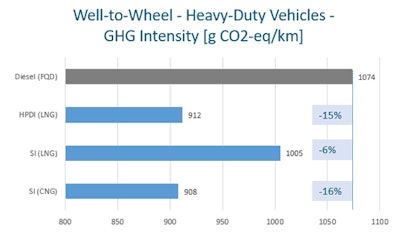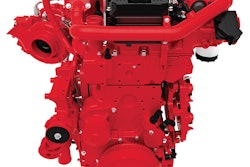
NGVA Europe (the European Natural & bio Gas Vehicle Association) has published a study that shows natural gas reduces GHG emissions from passenger cars on a Well-to-Wheel (WtW) basis by 23% compared with petrol and by 7% compared with diesel. The study, entitled Greenhouse Gas Intensity of Natural Gas, also shows that for heavy-duty applications, benefits compared to diesel are of 16% for CNG and up to 15% for LNG. Also in the maritime sector, overall WtW benefits are up to 21% compared to conventional HFO (Heavy-Fuel-Oil) fuels.
The use of renewable gas (biomethane – RNG) provides additional benefits towards carbon-neutral mobility: by blending natural gas with just 20% renewable gas, GHG emissions are reduced by 40% compared with oil-derived fuels.
NGVA Europe commissioned thinkstep AG, a German sustainability software and consulting company, with expertise in the Lifecycle Analysis (LCA) domain, to perform an industry-wide assessment of the supply of natural gas to Europe and its use in the European Union, mainly in the transportation sector. More than 50 companies from across the gas value chain took part in providing consistent, high quality data, referring to updated 2015 year figures and new technologies.
The report is intended to represent the new reference in the domain, providing a deep analysis of the GHG emission sources from the entire natural gas chain. This is fundamental in a transportation scenario asked to move from a long standing system, mostly based on oil derived fuels, towards low carbon and clean solutions. Different technologies will have to be compared according to a technology neutral approach, needed for a fair market development, that will be guaranteed only through WtW methodology.
The study confirms that the use of natural gas represents one of the most effective solutions to fight climate change and improve air quality in a cost-efficient way. Thanks to both CNG (Compressed Natural Gas) and LNG (Liquified Natural Gas), a wide range of transportation modes from small passenger cars to long haul trucks can deliver a reduction in both GHG emissions and local pollutants reduction.
Adding renewable gas to the mix
Biomethane is a viable, renewable, low-carbon fuel for the transportation sector. Both CNG and LNG can be produced from a wide variety of renewable energy sources, such as waste organic biomasses or directly converting CO2 and renewable hydrogen into synthetic methane. Under this perspective, the benefit of natural gas as low-carbon fuel is dramatically amplified on the Well to Tank (WtT) side, resulting in substantial reduction of the overall GHG emissions.
“Biomethane production is also a strong enabler of the circular economy, providing a clever way to produce clean and high quality fuel from local waste. Europe has a potential of fuelling more than 2 million vehicles with biomethane produced from organic waste, just transforming our domestic garbage into renewable gas, a sustainable and locally-produced fuel,” highlights Andrea Gerini, Secretary General of NGVA Europe.
When introducing renewable gas, WtW emissions remarkably drop, being reduced by 80-95% depending on the fuel source and production pathway. A 20% introduction of renewable gas into the natural gas pipeline at the 2030-time horizon is a realistic scenario, and this would translate into a 36% GHG reduction compared to conventional fuels. Incorporating future advancements in engine and vehicle technologies could further extend these benefits compared to current best in class gasoline and diesel vehicles.
Improving the air we breathe
Natural gas is an intrinsically clean fuel. Alongside climate change, concerns continue to surround urban air quality in many major cities and its consequent health impacts. In addition to the low GHG emissions, natural gas is the cleanest fuel to guarantee a particulate free combustion, aromatic free and close-to-zero NMHC (Non Methanic Hydrocarbons), as well as dramatically reducing NOx emissions, even under severe real driving conditions. NGVs offer a perfect solution with close-to-zero emissions level, available from today to improve air quality in the urban areas.
NGV technologies are mature, affordable, safe and ready to provide a fast and strong contribution to the transportation challenge thanks to a wide penetration potential. Compared to other technologies, the development of infrastructure and powertrain technologies using natural gas can be shared across almost all transportation segments, providing synergies and ultimately large scale adoption and benefits.
The published document is intended to be the new reference study, at least in Europe, concerning natural gas as a transportation fuel, providing high quality, reliable, and up-to-date industry-based life cycle data to inform the public and to support dialogue with external stakeholders and policy makers. It also aims to contribute to an informed debate during the revision process of the different policy actions concerning clean and efficient mobility.



















